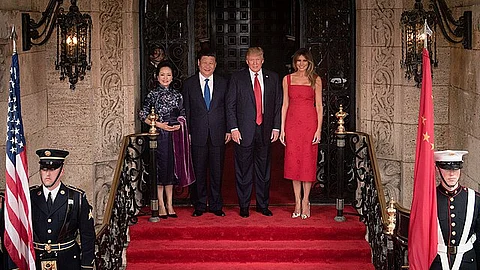

U.S. President Donald Trump has described Chinese President Xi Jinping as “VERY TOUGH, AND EXTREMELY HARD TO MAKE A DEAL WITH,” in a Truth Social post on Wednesday, signaling deepening friction in U.S.-China trade relations.
The statement follows accusations from both nations that the other has violated a May agreement aimed at reducing tariffs and easing trade restrictions.
In May, negotiators in Geneva secured a deal lowering U.S. tariffs on Chinese goods from 145% to 30%, while China reduced its tariffs on U.S. goods from 125% to 10%.
The agreement, hailed as a step to avert a larger trade conflict, included a 90-day suspension of most tariffs and China’s commitment to repeal trade countermeasures.
However, recent developments have strained this truce.
China’s Ministry of Commerce accused the U.S. of “severely violating” the agreement by halting sales of computer chip design software to Chinese firms, blocking Chinese-made chips from Huawei, and revoking visas for Chinese students.
The ministry also claimed U.S. actions breached a January agreement reached during a Trump-Xi phone call. Meanwhile, Trump alleged last week that Beijing “totally” violated the May deal, though he did not specify which provisions.
U.S. Trade Representative Jamieson Greer stated that China failed to remove non-tariff barriers as agreed.
White House officials indicated Trump and Xi might speak this week to address the disputes, though no confirmation of a scheduled call has emerged.
U.S. Treasury Secretary Scott Bessent noted Thursday that trade talks were “a bit stalled,” suggesting leader-level intervention is needed.
Chinese Foreign Minister Wang Yi, meeting U.S. Ambassador David Perdue on Tuesday, criticized U.S. “negative measures” as “groundless,” undermining China’s interests.
Perdue reportedly emphasized U.S. priorities on trade, fentanyl, and immigration, stressing the need for ongoing communication.
Analysts suggest Beijing is cautious, seeking assurances that a Trump-Xi call would not lead to surprises.
“This is apparently Beijing trying to leave the impression that the Trump wants to talk,” said Neo Wang, lead China economist at Evercore ISI, noting the Perdue-Wang meeting aimed to build trust.
As both sides navigate this standoff, global markets remain on edge.